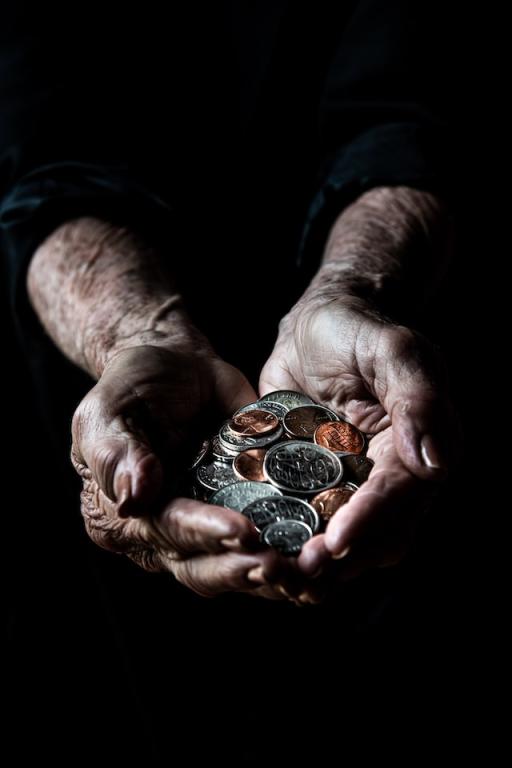When I was in seminary, I didn’t have a lot of money. I paid for school from paycheck to paycheck. I stocked groceries and worked on a college paint crew. I lived in an eight-by-forty-foot trailer that had been burned out and repaired; and it sat in a trailer park less than 50 feet from a railroad track.
Meals consisted mostly of starches of one kind or another. A pork chop for my birthday was a big event. But I had so little experience with cooking any kind of meat that I burned it to a crisp. I ate it anyway. And every car problem that I couldn’t fix on my own felt like a life and death crisis.
That state of affairs remained the same to one degree or another for about 12 years. I lived in other kinds of strange places. I ate other kinds of strange food. The five-gallon bucket of “unprocessed” peanut butter that I bought in England left a particularly vivid impression.
But money was a constant problem. As a result, it took years for me to think about money without seeing life through a lens of scarcity and a “worst-case” scenario in mind.
All of us have a history with money. Some of us have struggled to make ends meet. Some of us have had it far worse. My mother grew up in a log cabin with a dirt floor in rural Indiana, which is why I don’t talk much publicly about the financial struggles that accompanied those twelve years for that reason. After all, I was going to graduate school. She was simply trying to survive.
If you haven’t had one of those experiences, you should just thank your lucky stars. There isn’t anything noble or kind about being poor. It’s just hard. But that doesn’t mean that you don’t have a history with money, as well. Everyone does. You do. I do.
The reason, I am convinced, is because money is never just about money. It is about a life history. It reflects what we value. It reflects the state of our soul. We can be generous and giving. We can control it. Or it can haunt us. We can lapse into measuring our accomplishments with it. It can divide us and tempt us to make judgments about one another. And – with or without it – if we are not careful, money can become our God.
Put another way, money is a “minted spirituality.”[1] What I mean is this: Money is so unavoidable and such a pervasive factor in our lives, that we cannot avoid giving expression to what we value most by the way in which we pursue it and use it.
For that reason, we face an inescapable choice: We can either recognize that money reflects our spiritual values and let those values shape our use of it. Or we can choose to become money’s slaves. In which case, our use of it will be shaped by random and unexamined spiritual values that are, in fact, our real gods. That is what Jesus meant when he said you cannot serve God and Mammon, and that is why the decisions we make about money are spiritual decisions. Plainly, Jesus is saying, there is only one choice for people who call themselves Christians.
The question, then, is “How do we achieve some measure spiritual perspective on how we think about and spend the money that we have?” There are any number of passages in both the Old and New Testaments that we might look at in this connection, but perhaps the best and most direct is found in 2 Corinthians, chapter 8.
Writing to the Corinthians, Paul celebrates the generosity of the churches in Macedonia, who gave sacrificially to care for the poor in the church in Jerusalem, and in so doing he outlines guiding principles that can shape own approach to money. Paul writes:
…they gave according to their means…and beyond their means, of their own accord, begging us earnestly for the favor of taking part in the relief of the saints— and this, not as we expected, but they gave themselves first to the Lord and then by the will of God to us…as you excel in everything—in faith, in speech, in knowledge, in all earnestness, and in our love for you—see that you excel in this act of grace also. (ESV)
The bedrock principle here appears last in this passage: “as you excel in everything…see that you excel in this act of grace also.” In asking the Corinthians to contribute to the wellbeing of the church in Jerusalem, Paul is appealing here to a conviction that underlines almost everything that he teaches about the Christian life. It is even built into the logic of every letter that he writes. He always moves from the work of God in Christ to its implications for our lives.
What Paul is saying is that the most important thing about us as Christians is that we are beneficiaries of God’s grace. We use the word grace so often, that we often fail to grasp its significance. Yes, it is unmerited favor or love. But, true as that is, it doesn’t quite capture what Paul has in mind.
Jesus, dying on the cross, abandoned by his followers, mocked by those who executed him, utterly alone, navigating unbearable pain and, finally, death – that is the face of grace. The majesty and power of God set aside, the body of the Son tortured and finally executed in the name of rescuing us from an emptiness of our own making – often in spite of ourselves.
That fact about us, Paul is saying, should govern our self-understanding and it should govern everything that we do, including the use we make of the money that we have. We are indebted to God and, apart from God, we are powerless in any sense that matters.
The second principle, follows from the first: The only way that we can effectively contribute to the world is to share in the act of grace that saved us.
I did not see this truth for a long time in trying to resolve these issues for myself. It is so common to think that the Christian life is a two-part transaction – (1) get saved, (2) paddle like hell – that it was hard to see what is right in front of us in Scripture.
The Christian life is not about that at all. It is all about the same thing, and it all flows from the same place. When we are baptized, we surrender our efforts to save ourselves. We quit pretending that we are self-made and bulletproof. We are baptized into the life of Christ and it is out of that life that we live. It’s an organic whole, it is a lifelong journey. There is no such thing as my spiritual self and the rest of life. There is no such thing as the love of God and my independent efforts.
That applies to everything in life. But in the case of money what Paul is saying is that when we give to God’s work in the world, we live out of the greater, unimaginable self-giving of Christ on the cross. To put it another way: Giving is what people do who have been given everything.
It is not surprising, then, that the third principle is deeply related to the first two: Offering the Macedonians as an example, Paul writes, “their abundance of joy and their extreme poverty have overflowed in a wealth of generosity on their part. For they gave according to their means…and beyond their means, of their own accord, begging us earnestly for the favor of taking part in the relief of the saints.”
If we are people who are indebted to the self-giving of God in Christ, and if our lives are meant to be a participation in Christ’s self-giving, then it shouldn’t be a surprise to us to hear that our own giving is meant to be sacrificial. And this is the point that Paul makes.
The Macedonian Christians were not in a position to be generous, as we might describe it. Their giving wasn’t carefully circumscribed by their financial goals, as a financial planner might put it. And their giving was, as Paul puts it, “beyond their means.”
This third principle is the most difficult to grasp, particularly in our professionalized and therapeutic culture. We are accustomed to talking about saving space for ourselves and about preserving our boundaries. Those concerns are – to a point – legitimate concerns. And Jesus himself had what we might call boundaries. But those boundaries arose out of a life centered in God. And, as Paul notes here and elsewhere, Jesus lived among us sacrificially and with an eye to the needs of others on their own journey into God.
This principle – applied to our money – also requires sacrifice. What that looks like and what that requires from each of us will vary and can’t be quantified. Rightly understood, the tithe stipulated in the Old Testament wasn’t meant to fix a maximum, but was a way of reminding ancient Israel of its debt to God for everything it possessed, including life itself. And, certainly, that is the way that Jesus reads the Old Testament. My suspicion is that one of my friends was right when he noted that if we wonder what a sacrificial gift is, it is probably the gift that makes us at least a bit nervous.[2]
Pulling this all together, then, three truths about us should guide our giving to the church:
One, we are, above everything else, the beneficiaries of God’s grace.
Two, by giving we participate in the gift that Christ gives to us and to the world.
Three, that gift – like Christ’s gift of himself – should be sacrificial.
Like so many other truths about the Christian life, these principles can’t be applied mechanically. As I have already suggested, we each have a personal history with money. But they require us to respond with our lives.
The beauty of a life lived that way is that each of us will reveal Christ in a different way. The gift of a life lived in that way is spiritual freedom.
[1] The concept is adapted from Jacob Needleman’s Money and the Meaning of Life (New York: Doubleday, 1994).
[2] Thanks for my friend, Chris Olson, for this bit of wisdom.
Photo by Sharon McCutcheon on Unsplash

















